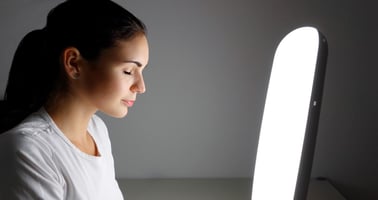Nearly 4 in 10 Americans Experience Declining Mood in Winter, APA Poll Finds

Declining mood affects 38% of Americans in the winter, APA’s November Healthy Minds Monthly Poll has found. The poll also found that 24% of Americans feel generally depressed in winter. APA’s Healthy Minds Monthly tracks timely mental health issues throughout the year.
The November Healthy Minds Monthly Poll, conducted online by Morning Consult from October 19 to October 21, asked 2,211 adults about the state of their mental health during the winter and found the following:
- 66% of participants noted behavioral changes during winter.
- 33% said they sleep more.
- 28% said they feel fatigued in the winter months.
- 21% said they become moody.
- 20% said they lose interest in the things they liked doing.
- 19% said they eat more sweets in the winter months.
- 17% said they had difficulty sleeping.
The poll also found that women and mothers were more likely than men and fathers to say their mood declined in the winter. Participants who lived in rural areas were more likely to report declining mood in winter compared with people who lived in suburban or urban areas. Furthermore, participants who lived in the Northeast and Midwest were more likely to say their mood worsened in the winter compared with those who lived in the South and West.
The survey also identified situations that improved participants’ mood during the winter; 44% of participants reported looking forward to spending time with friends and family during the holidays, and 49% said that enjoying good food improves their mood.
“Cold, dark weather can have a real impact on our mood,” APA President Rebecca W. Brendel, M.D., J.D., said in a statement. “Especially in northern areas of the country, where winter lasts for several months, it’s important to keep tabs on our mood and to seek help if sadness or other symptoms become overwhelming. It’s also a great time to remember that there are winter traditions and activities that can bring us joy and lift our moods.”
When asked about daylight savings time, 57% of participants said that the time change didn’t affect their mental health, 25% said it had a negative impact, and 18% said it had a positive impact. Parents were more likely to report a positive impact than nonparents.
The poll also examined awareness of seasonal affective disorder (SAD), a form of depression with symptoms that emerge in the fall or winter and typically resolve in the spring. Women were more likely to be familiar with it than men, and White and Latinx participants were more likely to be aware of it than Black participants. Among all participants, roughly half reported having heard or read about SAD. Slightly more than half gauged the symptoms of SAD as serious as depression, and just over a third said the symptoms are less serious. Men were more likely than women to consider the symptoms as less serious.
“Seasonal affective disorder is more than just the winter blues, and people need to be aware that if they’re having depression symptoms specifically during these months, it’s a medical disorder for which they can get help,” said APA CEO and Medical Director Saul Levin, M.D., M.P.A. “It’s important to get the word out, especially in communities that have been historically underserved by medicine, that this disorder exists and that help is available.”
For related information, see the Psychiatric News article “CBT, Light Therapy Found Comparable for Seasonal Affective Disorder.”
(Image: iStock/VSFP)
Don't miss out! To learn about newly posted articles in Psychiatric News, please sign up here.






